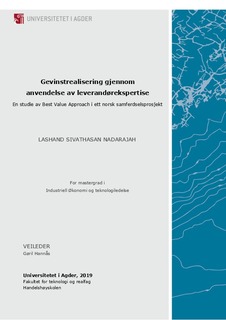| dc.contributor.author | Nadarajah, Lashand Sivathasan | |
| dc.date.accessioned | 2019-11-08T10:45:08Z | |
| dc.date.available | 2019-11-08T10:45:08Z | |
| dc.date.issued | 2019 | |
| dc.identifier.uri | http://hdl.handle.net/11250/2627389 | |
| dc.description | Masteroppgave industriell økonomi og teknologiledelse IND590 - Universitetet i Agder 2019 | nb_NO |
| dc.description.abstract | In the search for improved contract and project management in construction, the Best Value Approach (BVA) is a concept that has been introduced with a proven track record for better performance. The BV-philosophy stresses the importance of proper utilization of vendor expertise by putting aside management, direction and control by assumed non-expert clients. Through the process of Best Value Procurement (BVP), the assumed expert is identified and should be rewarded with supreme responsibility of the projectwith minimal involvement of the assumed non-expert client. The role of experts is therefore a success factor in applying BVA. The development of BVA has mainly taken place through lessons learned from several projects, and existing research is concerned with practicalities and “how” to apply the BVA-concept. The concept of BVA is based on Information Measurement Theory (IMT), which defines the expert as the vendor with the best proven ability to perceive and process dominant information to predict future outcomes of an event. However, research is scarce on what actually constitutes vendor expertiseand the associationto reduced uncertainty.Also, there is a lack of knowledge in howtraditional roles in projects changes in a BVA-context.In short, the concept lacks further scientific documentation regarding the underlying theoretical premises of BVA. To fill this void, the following two research questions are posed: 1)what constitutes vendor expertise, and howdoes it reduce perception of uncertainty by the client? 2)How can vendor expertise be utilized in order to achieve BVA-benefits? Thethesis explores what constitutes an expert in BVA by developing a framework that goes beyond IMT, by complementing it with elements of organizational capability, learning theoriesand decision-making. Through this framework Iinvestigate theassumed association of vendor expertise and reduced uncertainty perceived by clients in a Norwegian road construction project using thein-depthcase study method. Based on the case, the thesis establishes how experts canbeperceived in the contractingphase andexpose main decisive factorsforidentifying experts. By doing so, the thesis canunderstandhow selected expertise contributesto reduceduncertainty during contracting. To address the second research question, the thesisinvestigates to what degree the expertise is utilized after signing of a contract.Through this researchI conclude withimplications for theory and management, so that practitioners in BVA-projects can increase understanding of own roles andcontribute to realization of proposed BVA-benefits. | nb_NO |
| dc.language.iso | nob | nb_NO |
| dc.publisher | Universitetet i Agder ; University of Agder | nb_NO |
| dc.rights | Attribution-NonCommercial-NoDerivatives 4.0 Internasjonal | * |
| dc.rights.uri | http://creativecommons.org/licenses/by-nc-nd/4.0/deed.no | * |
| dc.subject | IND590 | nb_NO |
| dc.title | Gevinstrealisering gjennom anvendelse av leverandørekspertise : En studie av Best Value Approach i ett norsk samferdselsprosjekt | nb_NO |
| dc.type | Master thesis | nb_NO |
| dc.subject.nsi | VDP::Samfunnsvitenskap: 200::Økonomi: 210 | nb_NO |
| dc.source.pagenumber | 88 s. | nb_NO |

